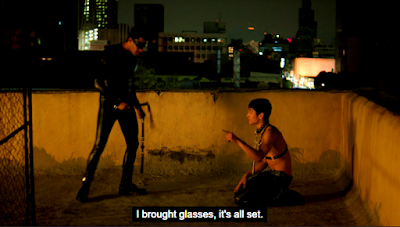walking the dog
by Douglas Messerli
Emiliano Arenales Osorio (screenplay, based on
an idea by Sergio Loo), Julián Hernández (director) Muchachos en la azotea (Boys
on the Rooftop) / 2016 [18.25 minutes]
A man, dressed in leather, stands on a
rooftop, crouching when he hears the sound of a helicopter and darting out of
its light, moving forward, to again crouch and hide from the light trained upon
him. He rushes forward, seemingly in escape or perhaps to some unrecognized
designation. We appear to be in the
midst of a tense adventure movie, the hero or the villain—we cannot yet define
his role—on the run.
But almost immediately after he comes upon another man, lying on the
floor of the roof in a fetal position, leather blindfolds around his eyes, a
leather gag in his mouth. The man of the run, Sergio (Hugo Catalán) bends to
stroke the bound man’s leg, and then licks the malleable leather garment and
moves up to what we now perceive as “the slave’s” tit. We are not, we now
perceive, in the world of adventure, but caught up in the site of an S&M
scene, as Sergio stands his slave, Octavio (Alan Ramírez) up, pulls out a whip
and thrashes his butt before placing a dog collar around his neck to which he
attaches a steel lead while grunting in explanation that he should get down on
all fours to perform the role properly.
A
dog now, instead of mere slave, Octavio does so, convincingly barking and
growling as Sergio pulls him forward, finally removing the gag so his barks and,
particularly, his dark gurgles of anger in regard to the lashes of the whip
might be better heard.
As I have written elsewhere, I am not a fan of leather play and S&M
games, so despite my commitment to see every film, and my particularly fondness
for the movies of Mexican director Julián Hernández, I almost paused this work
for later viewing the first time I saw it. But a moment later, now able to
speak, Octavio suggests the two break for a repast of wine and cheese, which he
has set up with blankets nearby.
Sergio pulls his dog the short ways to the pre-planned picnic, takes up
a bottle of wine, uncorks it, and pours himself a glass. But when Octavio
attempts to offer up his glass for filling as well, Sergio pushes him away,
growling out that dirty dogs to not drink wine, “they lick boots,” demanding
that Octavio does so.
The dog scoots over to the boots but merely
sits without obeying his order, Sergio breaking character to declare, “This
isn’t working.”
Although Sergio has been excited by the dance (with excellent electronic
music incidentally by Arturo Villela), the shorts and socks take him too much
back into the normative gay world they evidently inhabit most days. He is
disappointed, and Octavio, having promised him his fantasy for a birthday gift,
tries to get back into the previous game. Told once more to lick his shoes,
Octavio moves forward on all fours, leans down, pulls out a handkerchief to
buff them up, and quickly kisses the boots declaring that is all he will do. He
cannot possibly lick such dirty articles.
He
apologizes and tries once again to be the dog, sniffing around Sergio’s legs,
but when the excited lover pours wine down his back, it is simply too much!
Octavio stands, dresses and prepares to leave, with, now, Sergio begging him to
return to celebrate his birthday event.
Finally, to get him to come back he himself puts on the dog collar,
offering up the chain to Octavio, who reluctantly accepting it, replies, “Why
didn’t you tell me that what you really wanted was to be the slave.” He pulls
gently on the chain, Sergio on all fours, huffing and whimpering like a good
dog, as Octavio, now pulling him across the rooftop floor, commands, “Come on,
let’s go home.”
Once more acting is central to the game playing of this gay
relationship, and clearly by film’s end they have discovered which role they
each perform better.
If this short film might finally seem simply a joke or a coy tease,
through Hernández’s always brilliant command of the camera, intercutting
between the human body and the abstract objects within the shifting world of
rooftop late night and early morning lights and shadows, turns this basically
comic one-liner into a deeper adventure of desire and power, resolved finally
in their submission and attachment to the mundane, as they return to the safer
world of home and hearth.
Los Angeles, June 4, 2022
Reprinted from World Cinema Review (June
2022).







No comments:
Post a Comment